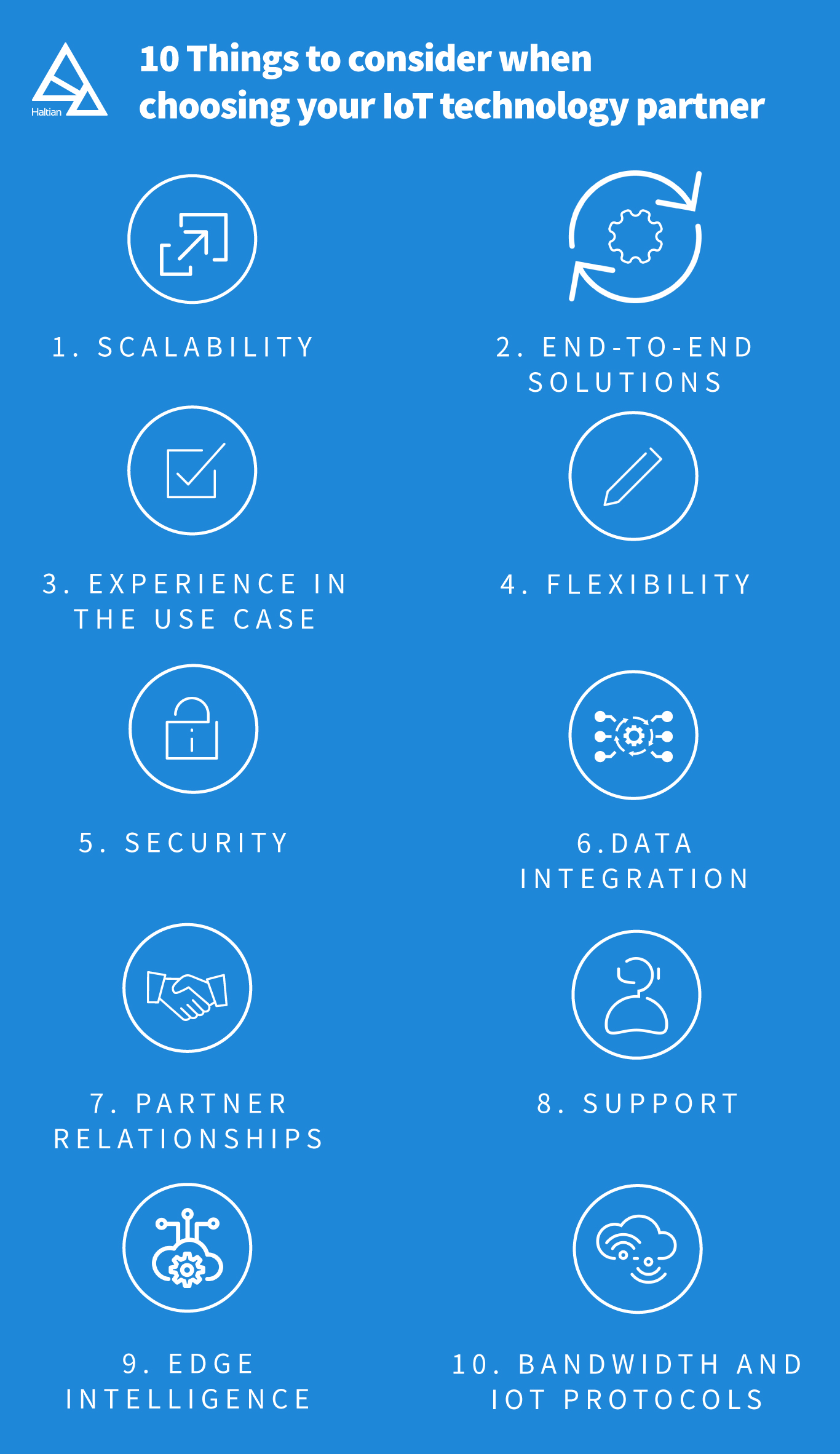10 Things to consider when choosing an IoT technology partner
When you’re planning to bring IoT as part of your business operations, choosing the right partner is critical, but often a daunting task. To help you figure out where to start when choosing an IoT technology partner, here’s a list of 10 things to consider and discuss with potential partners.
We have also created a knowledge base for you to learn more about IoT devices and value creation with them.
There is no shortage of IoT technology providers out there with a large variety of offerings. Often, you want to start working with one partner only, as working with multiple IoT vendors risk poor customer experience, security issues, unexpected costs and communication issues between the different technology providers.

1. Scalability
While most IoT projects start small, e.g. with a pilot, there should always be a plan in mind to scale in the future. This is why scalability is nowadays the number one thing to consider when choosing an IoT technology partner.
With IoT, we know that the number of connected devices is going to keep growing at a fast speed. An IoT technology partner needs to have the needed structure ready to scale your solution in their IoT device management, connectivity and cloud services.
2. End-to-end solutions
Rather than working with multiple vendors, in IoT, there’s a lot of value in a single IoT technology provider. It’s good to have an IoT connectivity partner with a flexible variety of services including the needed hardware, connectivity, device management, cloud service and integration services to your platform. This way, all the parts of your IoT solution will communicate with each other and you’ll easily get the support you need in the case of any problems.
3. Experience in your use case
Another thing to look into when choosing an IoT technology provider is in what field they have experience in. Every business domain has different requirements when it comes to IoT hardware and connectivity, so choosing an IoT solution provider with experience in your field is a good idea: not only do they have the correct solutions for you, but they’ve also gathered important learnings in your field.
4. Flexibility
No one can predict the future, so take flexibility into account when choosing an IoT technology provider. If your business needs change, you want a partner that can smoothly change with you. This is where we could help you:
5. IoT Security
IoT security is a hot topic and an important one when you’re considering adding IoT to your business operations. Find out a potential IoT partner’s security protocols and how their security measures fit your use case.
6. IoT Data integration
Having IoT data is worth nothing if you cannot use the data to improve your business. Make sure your future IoT technology provider can deliver Your IoT data from the cloud to your platform smoothly for analytics and business value.
7. Partner relationships
IoT is hard. There are several elements and steps in getting the data from a device to the customer and for an IoT solution to work, all these elements need to work seamlessly together. For this, IoT providers need good partners, be it in manufacturing, materials, connectivity or cloud services. Furthermore, to be always able to provide the best possible customer experience, IoT providers need to have good relationships with their partners.
8. Support
As said before, IoT can be a complicated field, but you should not have to worry about the technology. This is why IoT support is one of the important things to consider when choosing an IoT technology provider. Check what kind of support a potential IoT vendor can offer and how it fits the criticality of your IoT solution.
Creating an IoT devices solution is not only about having IoT devices. There are other costs, like support, that you should consider when estimating the total cost of ownership in your smart solution:
What are the factors affecting the TCO in smart solutions?
9. Edge Intelligence
IoT technology is a fast-growing industry and edge intelligence is one area where IoT is developing. Edge computing processes data locally and thereby reduces the traveling distance of the data. In some cases, edge computing might be a better option than cloud services and it’s good to take this into consideration when looking into your use case and different IoT providers.
10. Bandwidth and IoT protocols
To get the needed data transfer speed between the different components in your IoT solution, find out what bandwidth an IoT provider supports and what IoT connectivity protocols they use.
During this process, you should not forget about looking at the big picture of costs. Read our article on the total cost of ownership in smart solutions, and why you need to keep it in your mind right from the get-go:
Consider all these things when you are choosing an IoT technology partner for your solution. If you are thinking about changing your technology partner, read our reasoning for why it might make sense:

Changing your technology partner
Why should you do it?


